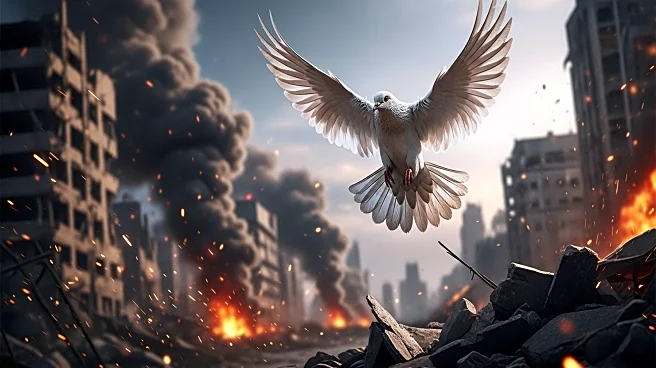What is the story about?
What's Happening?
The Israeli army has issued evacuation orders for residents in Gaza City, targeting high-rise buildings as part of an intensified offensive. The military is urging Palestinians to move south, citing the presence of Hamas operations in the area. This comes amid a humanitarian crisis, with Gaza City officially declared as suffering from famine due to Israeli restrictions on food aid. Many Palestinian families, already displaced multiple times during the ongoing conflict, face dire conditions with inadequate shelter and resources. The Israeli military has promised to provide field hospitals and food supplies within designated humanitarian zones, although these areas are overcrowded and lack basic necessities. Hamas has urged residents to defy evacuation orders, leading to further tension and uncertainty.
Why It's Important?
The escalation in Gaza City highlights the severe humanitarian impact of the conflict, affecting nearly one million residents. The Israeli offensive aims to pressure Hamas into surrendering, but critics argue it prolongs the war and exacerbates civilian suffering. The situation poses significant challenges for international aid organizations attempting to provide relief amidst ongoing military operations. The conflict has resulted in substantial casualties, with over 64,000 Palestinians reported dead, half of whom are women and children. The humanitarian crisis in Gaza could influence global perceptions and diplomatic relations, potentially affecting international policy and aid efforts.
What's Next?
The Israeli military plans to continue its offensive, with further evacuations and strikes expected. The situation remains volatile, with potential for increased civilian casualties and displacement. International pressure may mount for a ceasefire or diplomatic resolution, but Israel insists on Hamas disarmament and hostage release as preconditions. The ongoing protests in Israel demanding the return of hostages could influence government actions and negotiations. The humanitarian crisis may prompt further intervention from global organizations and governments, seeking to alleviate suffering and stabilize the region.
Beyond the Headlines
The conflict raises ethical questions about the impact of military actions on civilian populations and the responsibilities of warring parties to protect non-combatants. The prolonged war and humanitarian crisis could lead to long-term shifts in regional dynamics, affecting peace prospects and geopolitical alliances. The situation underscores the complexities of balancing military objectives with humanitarian concerns, highlighting the need for comprehensive strategies that address both security and human rights.















